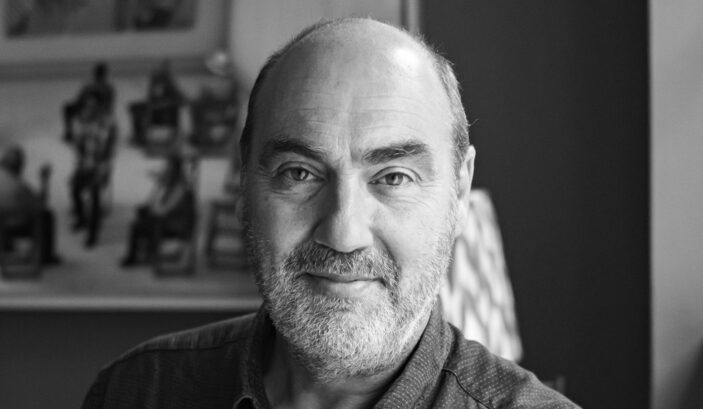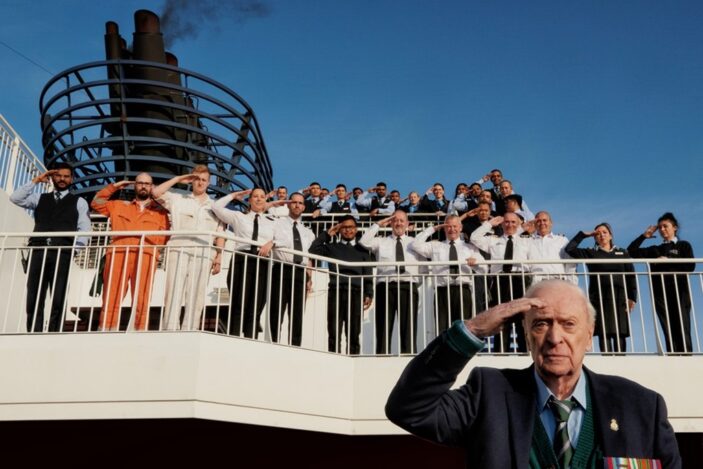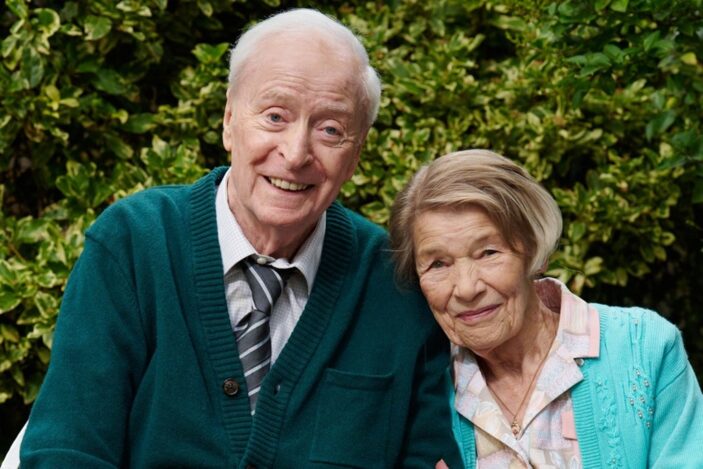
In the summer of 2014, Bernard Jordan made global headlines. He had staged a “great escape” from his care home to join fellow war veterans on a beach in Normandy, commemorating their fallen comrades at the D-Day Landings 70th anniversary. It was a story that captured the imagination of the world as Bernie embodied the defiant, “can-do” spirit of a generation that was fast disappearing. But of course, it wasn’t the whole story. It was an inspirational but sanitised retelling of one man’s need to come to terms with the lasting trauma of war.
Not only bringing Bernard’s “great escape” to life, but also shining a light on his enduring love story with his wife of 60 years, Rene, director Oliver Parker‘s The Great Escaper is a tender recount of celebrating love, life, and the lessons we can learn from the Greatest Generation.
As the film arrives in Australian theatres this week, Peter Gray spoke with the acclaimed director about the script subverting certain audience expectation, the delicate nature of navigating PTSD, and how it felt to have both Michael Caine and Glenda Jackson (in their final on-screen roles) on board. Oh, and Hellraiser, of course.
This was a story I wasn’t familiar with prior to seeing the film. Was this a story you were aware of before taking on The Great Escaper?
Yes, it was a little moment. It was a weekend, roughly, that it had a burst of publicity, about 10 years ago. I remember it happening then, but it seemed just like a curious, quaint little event. It brought a smile to one’s mouth. But then fast forward a few years and I hear a script is coming my way, and I was a little concerned. I thought it could be a little bit cheesy. A little British nostalgic number, which is going to be tough to tell. But then (William) Ivory’s script arrived, and I thought he was really onto something. And he was, in some way, subverting the event and finding some real teeth to it. And, if anything, he was accentuating the heart but looking for a kind of subversive energy, and that it made it a very appealing project.
I was going to ask about that. Is there that worry, as you said, when you get the script, that it could very easily give way to being a comedic romp? The poster for the film moved my idea for where it could possibly go. Yes, it’s an uplifting film, but it wasn’t as comedic as I was expecting.
I know. To be honest, I was never sure about the poster. But that’s not in my hands. But I agree with you. I sort of felt it wasn’t sending the right signals. But, at the same time, it’s proved to be very successful as a film, and I’m sure they know what they’re doing in terms of getting people through the door. But you’re right, it was sort of the opposite of what we were trying to do. Billy (William) did lace humour throughout the whole thing, which I’ve at least got as ballast.
Did you find it easy to navigate the comedic and dramatic aspects of the script?
Yeah. I think, to be honest, I love that you’ve got a dialogue in a film that can switch from one turn to another. As you mentioned Johnny English Reborn (prior to the official start of the interview), one of the approaches I took was that there are moments of real pathos. He’s ultimately a character that’s really doing his best. And he’s quite courageous in his way. Of course, you’re not playing it like a heroic movie, but how do we make him a little more attractive? Comedy and drama, I think, are wonderful interlocutors. They can bounce off one another.
PTSD is obviously a major theme of the film. Did you talk to many people to get an authentic take on that experience?
Very good question. I think Billy deserves a lot of that credit. We connected on this particular theme, because his father had been an RAF pilot in the war, and was quite badly damaged by PTSD, which he didn’t realise for many, many years. My dad was also a young soldier, and although he was very well balanced, on the whole, for the rest of his life, there were some areas that you just couldn’t talk about. He’d lost two brothers in the war, and you just couldn’t go there with him.
It’s so fascinating that there’s these pockets of their psyche which were so vulnerable and so powerful, and still so livid. Billy has grown with it, and he sees the signs of it, and he’s a very emotional man. He was really plugged into that. A lot of (the script) is about trying to actually find the nuance of it, and not expose too much.
I did have a conversation with a bunch of war vets, and I was thinking just how difficult it was. These are real lives and real people who have been very damaged by war, both physically and mentally. I had a brilliant conversation with this woman who had been a pilot for an Apache helicopter. She said this film is her life. She had to land (a helicopter) in enemy territory, and let soldiers off, who’d go running into battle. She’d wait for them to hopefully come back. The story we have here is the complicity in the machine that is war. You’re doing your job, and you’re showing immense courage, but, at the same time, the repercussions are so vast. Too much for a small human mind to comprehend, really. So, it was a huge validation, mainly to Billy and the creation of that story.

Is that something you’re consciously thinking of as you’re making it? That this story could affect so many people? Or can you not have such outside thoughts, and you just aim for the story to move as organically as possible?
To be honest, I find you move in and out a bit. You’re either right on the detail or you’re just looking to make the connections true between thoughts or feelings. Then you can step back and see where you’re going, you know? I was just looking at who’s on my bookshelf here, and I see Mamet, and it’s like how we’re talking about how every moment is almost a fractal version of the whole film. Every cast member, every line, somehow has to have the essence of what the whole film is. I find myself jumping in and out. Just trying to recalibrate to make sure I’m on the right track.
Speaking of getting on the right track, I imagine it helps when you have people like Michael Caine and Glenda Jackson. Were they the two that you always had in mind for this?
Michael had always been there as the first option. The soldier’s story felt so true to him. There’s not a big pool of actors that age, and we really wanted that kind of authenticity of a genuinely older actor, rather than a slightly younger actor playing it. That didn’t give us a huge choice, but Michael’s personality just seemed to suit. He’s got this playfulness and mischievousness, but then he can be quite profound in terms of the feelings and how he can communicate. He’s just gorgeous.
Casting Glenda was so exciting. We’ve only got a few great actress of that kind of age, and Glenda, to me, was the genuine article. I’ve been lucky enough to work with actresses like Judi Dench, and she could’ve been wonderful, but there’s something about the hard, tough, kind of in your face-ness of Glenda. Meeting her was a delight. She was not a disappointment. She’s got a very acute bullshit detector in her head, so you have to talk straight when meeting her.
I was amazed by watching her performance. Sometimes I didn’t see a lot of the things she was doing until I was in the editing (room). She was so layered. She’s got this marvellous mix of really profound intelligence, as well as all this available emotion. I found her mesmerising to work with. You know, she had such a tiny frame at that point. She was just shrunken, missing teeth, cataract eyes…she was looking rough, but she had this fire. She was always a distant hope, but she was our first choice.
There’s a real bittersweetness to both of their involvement here. Michael has obviously announced his retirement. And sadly this was Glenda’s final role. Did she have a chance to see the film before she passed?
I was so thrilled (she saw it), because I think I would have always felt a hole if she had not seen it. But she adored it. She never talked about her own performance at all. She was so sweet and roaring with laughter, and then seemed very moody. We nearly all went off to the Toronto Film Festival together. We were asked, and it would have been great, but she just suddenly spiralled. She’s very missed.

Going to do a complete 180 now, but I understand you’re part of the original Hellraiser? Is that correct?
I’ve got a little part in Hellraiser, yeah. Basically, that comes from Clive Barker. It was my first job as an actor. Right after leaving school I was with this little theatre company, and we did a bunch of shows. I stepped away from Cambridge to join his company because I had so fallen for his writing. We went around the UK in this little van, and (Clive) was in this incredible place, and out of that came Hellraiser. So Pinhead, Doug (Bradley), he was in the theatre company with us, and we did (Hellraiser) together. So, I have a small part, but I helped in putting it together.
One day (Clive) tells me he’s got these short stories, which turned out to be that series called “Books of Blood”, and somehow they get to (Steven) Spielberg, and he reads them and says “I’ve seen the future of horror, and it’s Clive Barker.” So, he went off and Hellraiser happened, and then Nightbreed, of course, and I have a more fun part to play in his later movies, where I play a beast, and I’ve got compressed air in my tentacles. That was an enormous partnership. I still keep getting invited to these conventions around the world, but it seems like another life (for me). I keep in touch with Clive, who I adore.
I ask about Hellraiser, because you having that experience in front of the camera, do you think that helps you as a director? Knowing what it’s like on the other end?
Yeah. I think there are a few directors who can do every bit of it, but it’s really hard, because there’s so many bits to directing. My way in was definitely as an actor. It took me a whole to step out of what you could call the “circle of action”, because I felt I was in it as an actor, and I had to keep telling myself to come back and look at it from here.
You can feel that actors feel reassured that somebody understands their pressures, that deep discomfort of feeling exposed and being a cog in this incredibly powerful and expensive machine. To have an understanding of that has been very helpful. It also helps sort out the storytelling, you know? You’re taking each character and you’re weaving them together. In terms of technicality, you can’t just start moving things around like a chess piece. You have to know what is really going on for that character. I think having had an acting experience is a really valuable part to directing.
The Great Escaper is screening in Australian theatres from March 7th, 2024.
